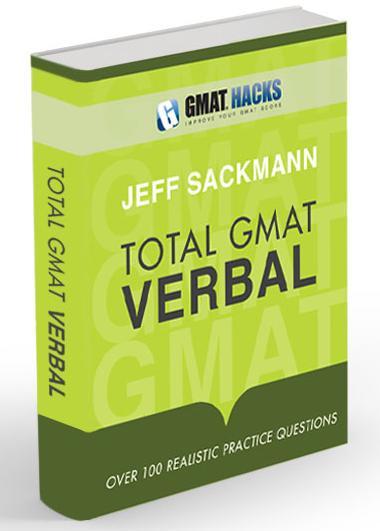
Bookshelf
|
|
Total GMAT Math Jeff's complete Quant guide, on sale now! |
|
|
Total GMAT Verbal Everything you need to ace GMAT Verbal! |
1,800 Practice Math Questions
Buy Jeff's books at Amazon.com

GMAT Official Guide, with IR
OG Math | OG Verbal
OG12 & Quant Rev solutions!
GMAT Question of the Day
Beginner's Guide to the GMAT
GMAT Hacks Affiliate Program

Recent Hacks

Categories
- General Study Tips
- Goals and Planning
- CAT Strategy
- The Mental Game
- GMAT Math Strategy
- GMAT Math Topics
- Mental Math
- Data Sufficiency
- Critical Reasoning
- Reading Comprehension
- Sentence Correction
- Analytical Writing Assessment
- Integrated Reasoning
- IR Explained
- Business School Admissions
- GMAT Prep Resources
- Practice Questions
- Total GMAT Math
- Total GMAT Verbal
- GMAT 111

How Important Are the First 5-10 Questions of Each GMAT Section?
February 26, 2010
| You should follow me on Twitter. While you're at it, take a moment to subscribe to GMAT Hacks via RSS or Email. |
Because the GMAT is a computer-adaptive test (read more about that in this tip), it's easy to think that the first few questions are more important than those later in the test. In a manner of speaking, they do have a greater effect on your score, but only in a manner of speaking. Ultimately, each question is of equal importance, and you should prepare to take the test with that knowledge.
The biggest fear I hear from students is that, if you make a stupid mistake on a couple of early questions, you can relegate yourself to a low score, no matter how you perform on the rest of the section. It's true that, if you get two of the first three questions wrong, that you'll have to perform better on the rest of the test to get, say, a 650, but that's only half the story.
Ultimately, the computer-adaptive test runs with a very well-designed algorithm with one purpose: to determine how good you are at the material it tests. If you perform at a 650 level, it doesn't really matter whether you perform better at the beginning and average out at the end, or perform poorly at the beginning and average that out at the end. In short: it would take a very strange set of circumstances for the computer-adaptive test to give you a score you didn't deserve.
Ways to Get a 650
Let's put this in terms of an example. Let's say you're a 650-level test-taker, but for whatever reason, you answer each of the first three questions incorrectly. (That in itself is a strange premise, but I'm trying to reduce some of your stress, so bear with me.) The test will assume you're not very good, and start giving you easier questions–maybe something near the 350 level. Since you are much better than that, the next few questions will be very easy–you'll get them right and even save some time.
It may be question #12 or #15 before you catch up to where you "should" be, seeing more difficult questions in the mid-600s. If you hadn't missed the first 3, you may have gotten there by #6 or #8. Does it matter in the long run? Absolutely not. The biggest danger in missing the first few questions comes from you: if you see a really easy question and stress out about how your test is going down the tubes, you're much less likely to take advantage of the easy questions and work your way up to a better score.
Fundamental Rule
Because test-prep companies like to sell you on their shortcuts and tricks, GMAT students end up hearing a lot about ways to "beat" the test. Frankly, most of these are hogwash. All you can do is prepare yourself by understanding how the test works, building a strategy around it (mostly based on time management, as detailed here), and internalizing it to the point that you don't have to think about it anymore. Once test day rolls around, all you can do is answer every question to the best of your ability, watch the clock, and keep your stress level under control.
If you put too much emphasis (read: time) on the first several questions, you directly jeopardize your ability to get your target score. You'll have to save that time at some point, and unless you're very good at answering GMAT questions quickly (and correctly, of course), that time will come off the end of the test. More disappointing test scores have come about through have to rush the final questions than any other single cause.
Treat every question the same way, and don't let anything the test throws at you convince that you're not doing well. The calmer you remain and the better you manage your time, the easier it will be to perform to the best of your ability.
About the author: Jeff Sackmann has written many GMAT preparation books, including the popular Total GMAT Math, Total GMAT Verbal, and GMAT 111. He has also created explanations for problems in The Official Guide, as well as 1,800 practice GMAT math questions.
 |
Total GMAT Verbal
The comprehensive guide to the GMAT Verbal section. Recognize, dissect, and master every question type
you'll face on the test. Everything you need, all in one place, including 100+ realistic practice questions. |